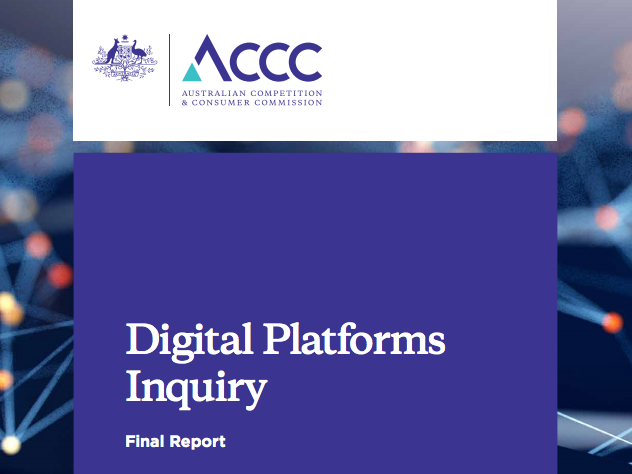Government gives green light to media agency inquiry in response to ACCC’s Digital Platforms Report
The Morrison government, led by Treasurer Josh Frydenberg, has approved an inquiry into advertising and media agencies, and will commit $27m over four years to a digital platforms branch – to sit within the Australian Competition and Consumer Commission (ACCC) – which will carry out such inquiries.
The inquiry into the “black box” process of buying and selling ad space is one of the most notable recommendations supported by the government in its long-awaited response to the ACCC’s Digital Platforms Inquiry. The resulting 623-page report, released by the ACCC in July, made 23 recommendations, the majority of which the government supports or supports in principle.

The ACCC Digital Platform Final Report was handed down in July


Well, that’s it folks, pack it up. It’s been a good run.
I wonder how media agency ‘leaders’ will insulate themselves from this one. A fair bit of who’s signature is on that one is about to take place, followed by some uncomfortable gulps.
“Coalition highlighted it will facilitate the development of a voluntary code of conduct”. – We already have that! This is just blowing hot air around. What a waste of time.
The media agency enquiry sounds very mysterious. I wonder whether they will pull apart the funding model for the big consortium agencies and look into how much margin the trading desks are taking
Must be referring to the Facebox and the Googlebox.
Someone pass me the popcorn….
What will they go after first?
– deals where agencies always choose their own ‘trading desk’ over everyone else
– where agencies preference media who give them free inventory for their ‘barter’ products
– agencies where rebates and inventory is passed through Singapore and then sold back to AU co
– platforms that allow dual access where fees to clients are hidden
– Fees that claim to be one thing, but are actually completely different
– Claiming to sell clients media that has been purchased but as a discount, but actually has been provided free due to client investment and then sold back to liquidate the inventory.
– not allowing media companies access to clients or staff unless they pay access fees
ACCC will have a ball on this one.
The carnival is over
… so where are all the ‘Agency CEO responses’?!
They are here:
https://mumbrella.com.au/a-long-overdue-big-step-forward-media-agencies-respond-to-accc-ad-tech-inquiry-610344
Thanks,
Vivienne – Mumbrella
Why does Mumbrella continue to allow comments to be made anonymously? If you want to print allegations of malpractice, put their names to it.
Why haven’t these side-line barrackers said something before, if they’re as knowledgeable and clever as they make themselves out to be about transparency and questionable practises?
I’d bet none have run a media agency.
I dislike malpractice as much as the next bloke, but I dislike functionaries yapping from the safety of the sidelines under the cloak of anonymity a lot less.
Brave little souls.
Alan Robertson
Unfortunately, by naming yourself in such a small industry as ours, you would risk a lot, especially with corporate policies on public commentary on press and social media etc. Naming and shaming is good, but Australian law allows defamation claims even if allegations are true, so publicly calling someone out with your real identity would pose a real litigation risk…
I’d argue that anonymous comments allow for a more frank discussion without putting your job at risk and risk of getting sued.
I run a media agency, that’s my real name and I and others (notably the independents) have been saying for years that what is happening is fraud.
Typical Boomer doesn’t like the internet giving the little guy (who stands to lose their job) a voice and demands justice… or else (he’ll probably whinge some more)!
As an agency owner I can’t pretend to be too excited about this imminent cavity search
So I’m going to hide behind an anonymous comment and grumble
I’m going to grumble about brands – my clients – who hijacked a digital platform enquiry and pushed for an inquest into agency services.
It’s just not the same thing. Facebook and Google have taken all the money and the entire sector is on it’s knees fighting for scraps.
As well as demolishing the media industry these global tech titans abuse privacy and dodge tax.
For a while agencies received rebates from publishers trying to stay alive. Whilst questionable clients had sliced fees and agencies need cash to make payroll.
This is not a profitable business. Agencies work hard for a living and it’s not easy to push back on demanding clients.
The industry has always taken a toll. But now its getting hollowed out by big tech. Facebook and Google have all the money, all the data and all the control.
This media agency review misses that bigger picture. Suddenly it’s about small time hustlers. Instead of the kingpins. How disappointing.
Poor Xaxis and Amnet….. nice knowing you both!!! Goodbye in the bin!
Particularly Xaxis, the bane of literally every publisher!!!
Well deserved, Ill laugh as they toss it into the flames.